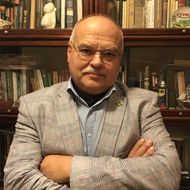- A
- A
- A
- ABC
- ABC
- ABC
- А
- А
- А
- А
- А
- HSE Campus in St. Petersburg
- Institute of Asian and African Studies
- News
- First Youth International Conference ‘Hard Science Methods in Asian Studies’ Took Place at HSE in St. Petersburg
-
Institute
- About the Institute
- Faculty and Staff
-
Departments
-
- Department of Middle Eastern and African Studies
- Department for Chinese, South and Southeast Asian Studies
- Department of Japanese Studies
- Department of Korean Studies
- Department of International Relations and Political Processes in Asia and Africa
- Department of Public and Cultural Development in Asia and Africa
-
- Degree Programmes
190121, Saint Petersburg,
Soyuza Pechatnikov str., 16
The Institute of Asian and African Studies was established in 2022 at HSE University-St Petersburg based on the Department of Asian and African Studies, the undergraduate and graduate programmes in the related field, as well as the Centre for Asian and African Studies. The Institute focuses on the development of professional education along with Asian and African studies as a field of scientific knowledge, aiming to preserve and enhance the achievements of the St Petersburg school of Oriental Studies.
Asian and African Studies
Cross-Cultural Studies of Asia and Africa in the Context of International Relations
 EU–Central Asian Interactions: Perceptions, Interests and Practices
EU–Central Asian Interactions: Perceptions, Interests and Practices
Arynov Z., Bossuyt F., Davletova N. et al.
Abingdon: Routledge, 2024.
Journal of Current Chinese Affairs. 2025. Vol. 54. No. 1. P. 25-47.
In bk.: EU–Central Asian Interactions: Perceptions, Interests and Practices. Abingdon: Routledge, 2024. Ch. 6.
Krivokhizh S., Akopov S.
Basic research program. WP BRP. National Research University Higher School of Economics, 2019. No. 65/PS/2019 .
190121, Saint Petersburg,
Soyuza Pechatnikov str., 16

First Youth International Conference ‘Hard Science Methods in Asian Studies’ Took Place at HSE in St. Petersburg
On November 10th and 11th, 2015, the First Youth International Academic Conference ‘Hard Science Methods in Asian Studies’ took place at HSE in St. Petersburg. It was organized by the Centre for Asian and African Studies together with the Department of Asian and African Studies. The event attracted Russian and international researchers from St. Petersburg, Moscow, Armenia, and Germany, as well as undergraduate and postgraduate students from Russian and international universities.
Participants of the plenary session ‘Hard Sciences in Oriental Studies: Methods and Approaches’ discussed the specifics and problems of applying hard science methods to various areas of social studies. The discussion was moderated by Evgeny Zelenev, Head of the Department of Asian and African Studies and Director of the Centre for Asian and African Studies, and Olessia Koltsova, Head of the Internet Studies Lab. Tatiana Alexeeva and Elena Kudryashova, researchers from the HSE Department of Applied Mathematics and Business Informatics in St. Petersburg, presented a paper on the theory of dynamic systems in social studies, which was prepared together with Gennady Leonov, Dean of the Faculty of Mathematics and Mechanics at St. Petersburg State University (SPbSU), and Nikolay Kuznetsov, Associate Professor at SPbSU. Alexander Zheltov, Head of the SPbSU Faculty of Asian and African Studies Department of African Studies, spoke about the application of hard science in language studies.
Two master classes were held as part of the plenary session. The first one was given by A. Gorodetsky and V. Zinyakov, researchers from the RAS Institute of Problems of Mechanical Engineering and St. Petersburg State Polytechnic University. It was based on a study of mathematical methods and software to detect 2D images with partially missing fragments on tangible media in Asian cultural heritage. The second master class, prepared by Sergey Koltsov and Olessia Koltsova from the HSE Internet Studies Lab, was dedicated to the automated analysis of texts in Asian studies, using the examples of Chinese and Arabic languages.
The audience and participants of the session ‘Hard Science Methods and Data Analysis in the Web Space in the Context of Rare Languages Use’ learned more about current corpus studies through the example of Asian languages, about the opportunities offered by computer processing of text information, and its application in various studies. Young researchers presented their papers on the application of hard science methods to historical research, the study of archaeological artifacts, paintings and folklore, as part of the session ‘Hard Science Methods in the Study of History and Culture of Asian and African Peoples’.
Conference participants were impressed by the relevance and practical importance of the collaboration between hard sciences and Asian studies in the context of cultural and historical processes, as well as the large number of joint papers prepared by social and natural scientists.
-
https://elearning.hse.ru/en/mooc/
Massive Open Online Courses
-
https://www.hse.ru/en/visual/
HSE Site for the Visually Impaired
-
http://5top100.com/
Russian Academic Excellence Project 5-100
- © HSE University 1993–2025 Contacts Copyright Privacy Policy Site Map
- Edit
